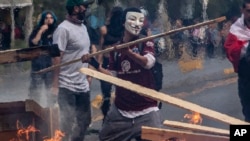Soldiers patrolled the streets in Chile's capital Saturday for the first time since the military dictatorship of Gen. Augusto Pinochet ended in 1990, summoned to keep order following violent protests over subway fares.
The military presence was part of a state of emergency declared by President Sebastian Pinera in response to student-led protests Friday that paralyzed the city.
Protesters burned several subway stations and damaged dozens of others, and some set fire to a high-rise energy company building. Officials reported 156 police officers and 11 civilians injured and more than 300 people arrested.
The conservative Pinera vowed that those responsible for the violence ``are going to pay for their deeds.''
New but less rowdy protests broke out again at midday Saturday in several areas around the metropolitan area, and police fired tear gas to break some of them up. Pot-banging and honking spread to cities to the country's north and south.
The government recently raised subway fares from about $1.12 to $1.16 because of rising fuel prices.
The head of the subway system, Louis De Granges, said the vandalism caused hundreds of millions of dollars in damage and said it wasn't clear when service could resume. That means some 2.4 million people could have difficulty getting to work or school on Monday.
Chilean governments of left and right have been wary of bringing soldiers back into the streets since the end of a dictatorship during which thousands of suspected leftists were killed and dissent was ruthlessly crushed.
``Pinera's decision to deploy the military in Chile — a country that experienced a 17-year repressive dictatorship — is troubling and could further destabilize the situation,'' said Jenny Pribble, associate professor of political science at the University of Richmond. ``It also sends a message to Chileans that the parties of the right still see the military, and not democratic process, debate and dialogue, as the ultimate solution to social conflict.''
The state of emergency limits rights to free assembly and movement.
Soldiers Patrol Chilean Capital After Violent Protests









